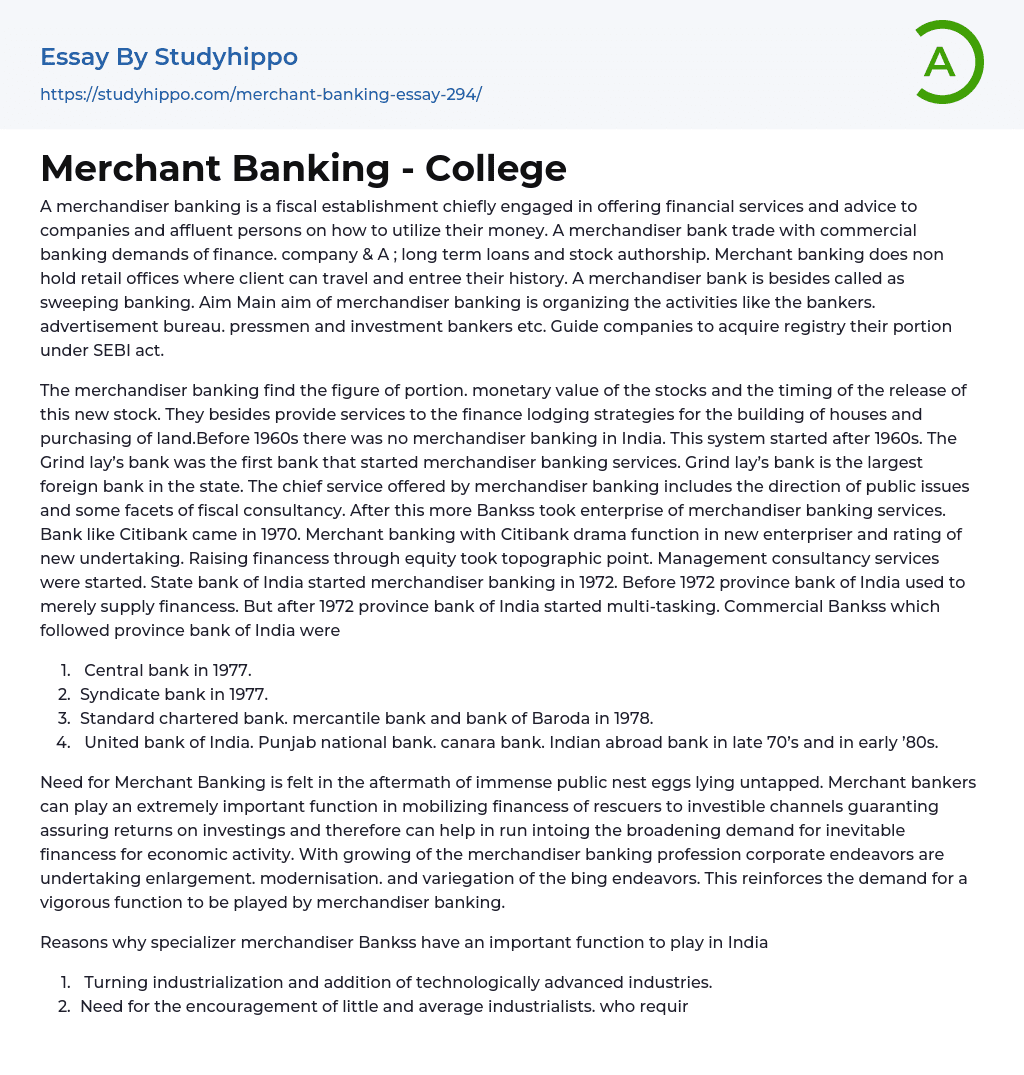A merchant bank is a financial institution primarily focused on providing financial services and guidance to businesses and wealthy individuals on how to manage their money. It deals with the financial requirements of commercial banking.
A company known as A offers long term loans and stock authorship. Merchant banking, also known as wholesale banking, does not have retail offices for customer access. Its main aim is to organize activities like bankers and advertising agencies.
Pressmen and investment bankers provide guidance to companies for registering and acquiring their portion under the SEBI Act. They also determine the figure of portion, the stock's monetary value, and the timing of its release.
In addition, they also offer services for financing housing strategies and land purchases. Prior to the 1960s, India did not have merchant banking. This system began in the 1960s with Grindlay's Bank bei
...ng the first to provide merchant banking services. Grindlay's Bank is currently the largest foreign bank in the country. The primary services provided by merchant banking include managing public issues and providing certain financial advisory services.
Following this development, more banks began to take advantage of merchant banking services. Citibank, for instance, entered the scene in 1970, playing a role in supporting new entrepreneurs and evaluating new projects. Additionally, fundraising through equity was facilitated, and management consultancy services were initiated.
In 1972, the State Bank of India took the lead in merchant banking by expanding its services beyond funding. This pioneering move was followed by other commercial banks such as the Central Bank, Syndicate Bank, Standard Chartered Bank, Mercantile Bank, and Bank of Baroda in 1977. In the late 1970s and early 1980s, more banks including United Bank of
India, Punjab National Bank, Canara Bank, and Indian Overseas Bank entered the merchant banking sector. The demand for merchant banking arose from an abundance of untapped public savings that could be utilized for profitable investments by these bankers. As a result, this surge in merchant banking has contributed to the growth of corporate enterprises.
The need for a strong role in merchant banking is reinforced by the modernisation and diversification of existing enterprises. There are several reasons why specialist merchant banks have an important role to play in India:
- Industrial growth and the emergence of technologically advanced industries.
- Support for small and medium-sized industrialists who require specialized services.
- Increasing complexity in government regulations and processes.
- Development of underdeveloped areas and states with unique requirements.
- Exploration of opportunities for joint ventures abroad and in foreign markets.
- Promotion of the New Market's role in mobilizing savings from the public.
- Commercial Bank essays
- Debit Card essays
- Deposit Account essays
- Subprime Lending essays
- Bank essays
- Banking essays
- Corporate Finance essays
- Credit Card essays
- Currency essays
- Debt essays
- Donation essays
- Enron Scandal essays
- Equity essays
- Financial Accounting essays
- Financial Crisis essays
- Financial News essays
- Financial Ratios essays
- Financial Services essays
- Forecasting essays
- Foreign Exchange Market essays
- Free Market essays
- Gold essays
- Investment essays
- Legacy essays
- Loan essays
- Market Segmentation essays
- Money essays
- Personal finance essays
- Purchasing essays
- Retirement essays
- Shareholder essays
- Stock Market essays
- Supply And Demand essays
- Venture Capital essays
- Accounting essays
- Andrew Carnegie essays
- Automation essays
- Business Cycle essays
- Business Intelligence essays
- Business Model essays
- Business Operations essays
- Business Software essays
- Cooperation essays
- Cooperative essays
- Corporate Social Responsibility essays
- Corporation essays
- Customer Relationship Management essays
- Family Business essays
- Franchising essays
- Harvard Business School essays




